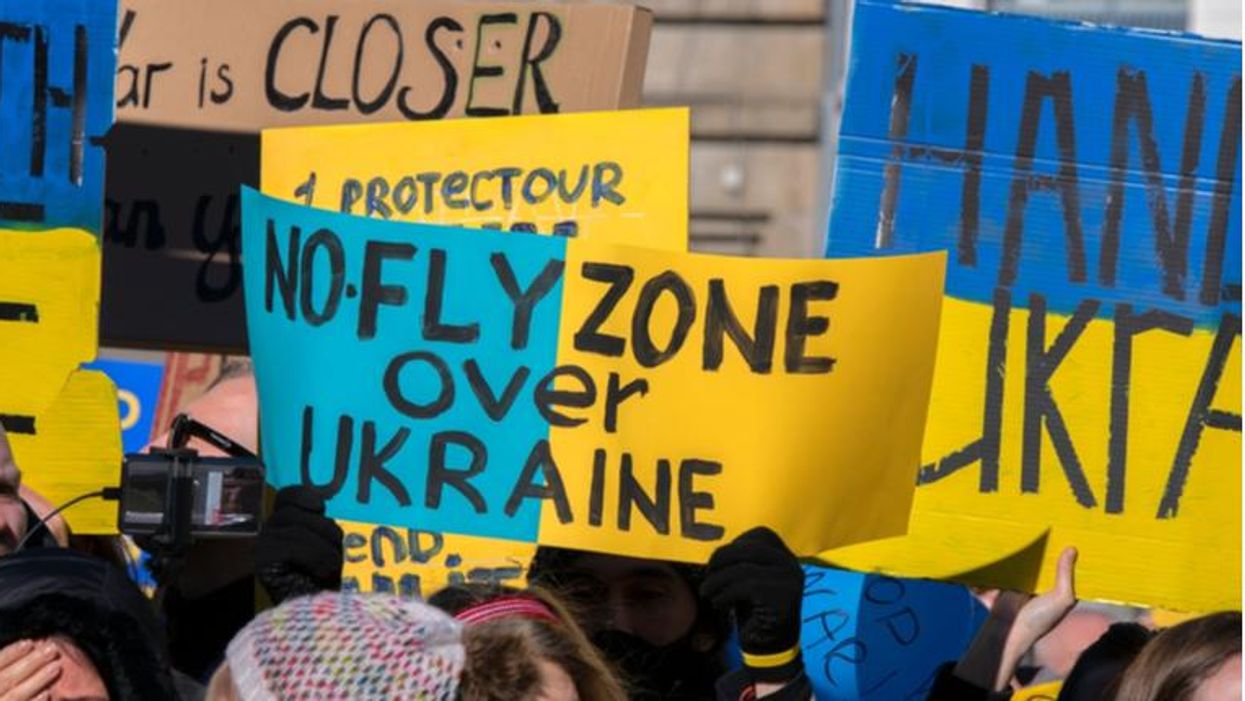Estonia becomes first NATO ally to demand no-fly zone over Ukraine


The Eastern European nation of Estonia on Monday became the first member of the North Atlantic Treaty Organization and European Union to call for a no-fly zone over Ukraine as attacks from invading Russian forces on population centers continue to escalate.
Lawmakers in the Riigikogu, the country's parliament, overwhelmingly approved a resolution urging the United Nations to close the skies over war-torn Ukraine.
Ninety ministers out of the 101-seat governing body voted in favor.
"The Riigikogu appeals to the UN member states to immediately take measures to establish a no-fly zone in order to avoid mass casualties among the civilian population of Ukraine," the Riigikogu said in a press release. "The Riigikogu calls on the parliaments of all states to adopt statements calling on the respective governments to support the imposition of additional sanctions against the Russian Federation and the Republic of Belarus participating in the aggression."
The announcement also included demands for Ukraine's immediate admission into the EU, for NATO to provide Ukraine with a "roadmap" for entry into the alliance, for the cessation of all trade with Russia, for European allies to "close their airspace and ports to aircraft and ships of the Russian Federation," as well as for a "vote for the exclusion of the Russian Federation from the Council of Europe and calls on the member states to take the appropriate decision without delay."
Speaker of the Verkhovna Rada @r_stefanchuk:\n"@Riigikogu has adopted a decision calling on the @UN member states to close the #Ukrainian sky from the Russian aggressor. This is the first decision from the parliament of a country that is a member of the #EU and @NATO.pic.twitter.com/A1gmVA7A0b— Verkhovna Rada of Ukraine (@Verkhovna Rada of Ukraine) 1647287114
Ukrainian President Volodymyr Zelenskyy has repeatedly pleaded with the United States, NATO, and the EU to protect his country's airspace. But the West has so far refused, fearing that any direct engagement between American and Russian troops would quickly spiral into a global conflict.
It should be noted, however, that neither the US nor NATO have publicly established what their thresholds for entering the war – short of Russia targeting NATO – would be.
Nevertheless, American officials have confirmed that the US and NATO are steadfastly opposed to imposing a no-fly zone over Ukraine.
"No-fly zone has a nice air policing sound to it, but I participated in one as a young officer on an aircraft carrier way back in the early ‘90s. It is combat. You have to be willing to shoot and to be shot at," Pentagon spokesman John Kirby said on Sunday's edition of ABC's This Week.
Those concerns primarily stem from Russian President Vladimir Putin's threats to use nuclear weapons against any nation that chooses to "interfere" with his "special military operation" in Ukraine. Putin's unprovoked attack on Ukraine, however, looks more like genocide than a mere attempt at occupation. His troops – although they have been significantly held at bay due to the heroic defensive efforts by the Ukrainians – have grown more aggressive in their assaults on civilians. Weapons such as cluster bombs, which are banned by the Geneva Convention, have been used. The International Criminal Court, located in The Hague in The Netherlands, has opened war crimes investigations into Putin's actions.
Every day that the bloody conflict drags on, the risks of a clash with NATO rise. Intelligence reports have indicated that Putin may be planning to stage false-flag biological or chemical attacks on Ukrainian targets. The captures of the Chernobyl and Zaporizhzhia Nuclear Power Plants have sparked worries that Russia could release radioactive material, which would rapidly spread over vast swaths of Ukraine and cause both human and ecological devastation. And over the weekend, 35 people were killed when the Russians bombed the Yavirov International Peacekeeping and Security Center, a large military installation situated a mere 15 miles from Ukraine's border with Poland, a NATO member state.
Despite the US and NATO's no-go stance on a no-fly zone over Ukraine, White House National Security Adviser Jake Sullivan reaffirmed the US's commitment to NATO on Sunday.
"The United States will work with our allies to defend every inch of NATO territory, and that means every inch," Sullivan said on This Week. He added that even if an incursion occurs by accident that the "NATO alliance would respond to that."
In that case, World War III is almost an assured outcome, as President Joe Biden stressed on Friday afternoon.
“As we provide this support to Ukraine, we’re going to continue to stand together with our allies in Europe and send an unmistakable message: that we will defend every inch of NATO territory,” Biden said during a speech to Democrats in Philadelphia, Pennsylvania. “If they move once -- granted, if we respond, it is World War III, but we have a sacred obligation on NATO territory.”